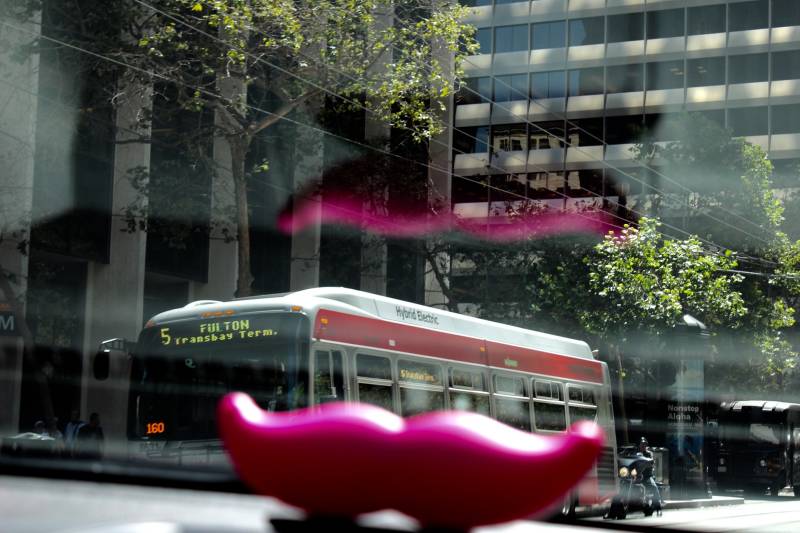Safety Concerns
In cities across the country, Uber and Lyft have been fighting efforts to require more stringent background checks, insisting that their current methods are sufficient.
Most major American cities have been regulating taxicabs for decades. But as reports surface in cities about passenger safety problems with the ride services, some are making a move to craft their own regulations, such as fingerprinting Uber and Lyft drivers, said Dave Sutton, the head of Who's Driving You, an organization representing the taxi, limousine and paratransit industries.
"Uber is pushing at the state level to basically preempt that local control, and avoid things like fingerprint background checks, which they believe slows their business development down," Sutton said.
In Los Angeles, Mayor Eric Garcetti and two city councilmen, Paul Krekorian and Herb Wesson, recently sent a letter to the CPUC asking the agency to allow the city to do a fingerprint background check pilot program. Current CPUC regulations do not require fingerprint background checks, which are required for taxicab drivers in many large cities.
Their request was denied by CPUC Commissioner Liane Randolph, who said she wanted to first consider whether fingerprint background checks should be required by the CPUC. She wrote that she hoped to provide some direction on the issue by this fall.
San Francisco Enforcement
In the hometown of Uber and Lyft, the San Francisco Municipal Transportation Agency would like to enforce state ride-service regulations, since the CPUC doesn't seem to have the ability to do so.
“I can’t imagine that would be too controversial, given that the rules are already in place," said Kate Toran, head of the SFMTA's taxi division. “We’re not talking about establishing new rules, although I’d be happy to do that as well.”
The SFMTA currently has seven taxi investigators, and the agency would theoretically hire more to enforce state rules on ride services. The penalties and other details about how the program would work haven't been discussed.
Some estimates have put the number of ride-service vehicles in San Francisco at 20,000, although it's hard to peg an exact number. Both Uber and Lyft are protective of their trip data, which might indicate how all those ride-service cars are impacting transit, congestion and the environment.
Cities vs. States
Since California first adopted its ride-service rules in 2013, 29 states and 40 cities have enacted regulations, according to an Uber spokeswoman.
Uber officials have argued that rather than deal with a patchwork of local regulations, they prefer a uniform statewide policy. Some trips, they say, may also cross over several jurisdictions.
In California, whether the CPUC even has the authority to regulate Uber and Lyft at the state level is a question currently being argued in federal court, where San Francisco-based Flywheel Taxi has sued the agency, contending ride services should be regulated by cities.
The crux of Flywheel's argument that cities have regulatory authority is its contention that ride services are not "prearranged" but are rather "on-demand," like taxicabs, which can be hailed on the streets, and are overseen by local agencies.
"This lawsuit is intended to make sure everyone gets to compete, while playing by the same rules," said Flywheel's president, Hansu Kim.
The CPUC's lawyers recently moved to dismiss the suit, arguing that the agency does have authority under the Public Utilities Code. They say that was blessed by the Legislature when it passed a bill by Assemblywoman Susan Bonilla clarifying insurance coverage and "ensuring oversight" of ride services by the CPUC.
CPUC Reform
State lawmakers, meanwhile, are considering another round of legislation to reform the CPUC, and to enact tougher rules on ride services. One bill, by Assemblyman Ben Hueso, passed its first committee test Tuesday. It calls on the CPUC to oversee prices, do more stringent background checks and look into how ride services can better serve people with disabilities.
A reform measure, proposed as a constitutional amendment, would give the Legislature the authority to break up the CPUC. Some lawmakers say the agency is stretched too thin.
According to a 2014 report by the state auditor, the CPUC's Transportation Enforcement Branch has 45 staffers overseeing ride services, limousines, charter buses, airport shuttles, moving companies, light-rail public transit, railroads and ferries.
Some consumer advocates, though, aren't so sure the regulation of ride services should be taken away from the CPUC.
"I think it's never good when a regulator doesn't want to regulate an industry that they regulate," said Jamie Court, head of Consumer Watchdog. He said he thinks the CPUC is the "appropriate umpire" to oversee ride services.
"While they can defer to localities' restrictions, which they should, there also needs to be a baseline for rural areas and other cities that haven't gotten into the fray, or where the political will isn't there to regulate the companies," he said.
